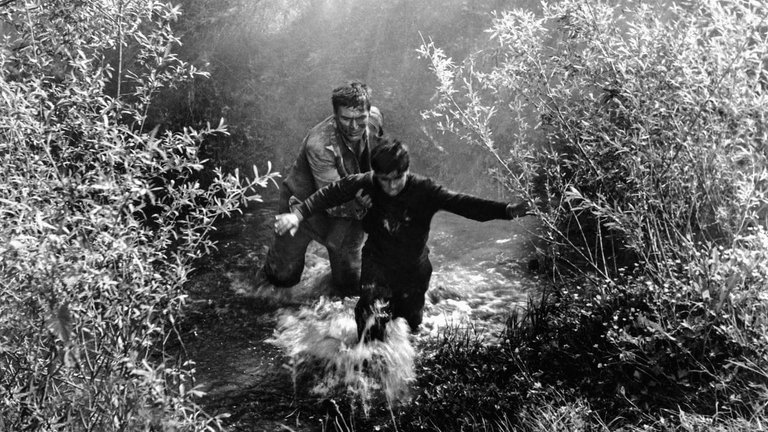Film Review: Don't Loock Back, My Son (Ne okreći se sine/My Son Don't Turn Round, 1956)

The harrowing consequences of war on innocent lives, particularly children, is one of the most disquieting aspects of armed conflict. Branko Bauer, one of the most renowned, but also most underrated Croatian film directors, has delved into this sombre theme in his most celebrated works. This included 1956 war thriller Don’t Look Back, My Son (also known by alternative title My Son, Don't Turn Round), widely regarded as one of the grand classics of Yugoslav cinema.
The plot takes place in Croatian capital of Zagreb during World War II, when it was under the fascist rule of the pro-German Independent State of Croatia. The protagonist, played by Bert Sotlar, is Neven Novak, an engineer who had joined the resistance movement only to be arrested and sent to the notorious Jasenovac concentration camp. During his train transport, he and fellow detainees seize the opportunity for a daring escape. He returns to Zagreb in order to seek shelter and potential connections that would take him to Partisan-controlled territory. He learns that his young son Zoran (played by Zlatko Lukman) has been taken into an Ustasha orphanage where he is being indoctrinated with fervent loyalty to the regime. Determined to rescue his son from brainwashing, Novak must employ every ounce of cunning, skill, and tenacity while evading relentless pursuit by Ustasha secret police.
Produced by Jadran Film roughly a decade after the end of the war, Don’t Look Back, My Son, especially when compared with the earliest films with similar subject, showcases the remarkable advancements made by Croatian and Yugoslav cinema in a short period. The film boasts high production values, with Branko Blažina's black-and-white cinematography capturing the nighttime action scenes as well as the Zagreb locations to great effect. Score by Slovenian composer Bojan Adamič, who would later become famous for most spectacular Partisan films, incorporates subtle jazz motifs, contributing to the film's overall noirish atmosphere.
The script, co-written by Bauer and Arsen Diklić, remains within limits of official Communist Yugoslav propaganda, but offers more nuanced and realistic approach to one of the darkest and more controversial chapters of Croatian history. Ustashas are portrayed as equivalent of Nazis and embodiment of pure Evil, but nevertheless intelligent and capable villains. Many characters show complexities and various shades of moral alignment during wartime. This includes Novak's former girlfriend Vera (played by Lila Anders), who gives him aid while unapologetically supporting herself through liaison with German officer. One of Novak’s pre-war friends, played by Mladen Hanzlovsky, is revealed to be Ustasha officer and he reports Novak to authorities, much to the displeasure of his elderly parents who are portrayed as decent people.
This motive struck very personal note to Bauer, who was very much inspired by the incident he had witnessed during the war. One day on the street he saw a Jew being forcibly taken by Ustasha police and, in desperation, calling for passerbys to come to his aid, which none, including Bauer, did. Bauer felt deep shame over his conduct and tried to make amends by having similar scene in the film. The same scene, which also included a child, was one of the first and most powerful depiction of Holocaust in Croatian cinema.
Bauer was fortunate to have a talented cast at his disposal, particularly Slovenian actor Bert Sotlar as Novak, who delivers a compelling performance alongside child actor Zlatko Lukman. Bauer's handling of the father-son relationship is superb, and it fits perfectly into the plot that combines suspense, action, and melodrama with ease.
While the second half of the film becomes somewhat overcomplicated, with plot twists that might be lost to less perceptive viewers, the final act culminates in a predictably melodramatic conclusion that is redeemed by a symbolic shot of a circling motorcycle.
Upon its release at the Pula Film Festival, Don’t Look Back, My Son won the Golden Arena, the top Yugoslav film award at the time. This success was followed at the box office, where it gained reputation of one of the most memorable films of its time. Arsen Diklić soon adapted the script into eponymous children’s book.
Despite being nearly seven decades old and looking slightly old-fashioned in strictly technical, it is still a film that pulls strong emotional punch. The universal themes of human suffering and resilience continue to resonate with audiences today, making it an enduring classic of 1950s cinema.
RATING: 8/10 (+++)
Blog in Croatian https://draxblog.com
Blog in English https://draxreview.wordpress.com/
InLeo blog https://inleo.io/@drax.leo
Hiveonboard: https://hiveonboard.com?ref=drax
Rising Star game: https://www.risingstargame.com?referrer=drax
1Inch: https://1inch.exchange/#/r/0x83823d8CCB74F828148258BB4457642124b1328e
BTC donations: 1EWxiMiP6iiG9rger3NuUSd6HByaxQWafG
ETH donations: 0xB305F144323b99e6f8b1d66f5D7DE78B498C32A7
BCH donations: qpvxw0jax79lhmvlgcldkzpqanf03r9cjv8y6gtmk9
Posted Using InLeo Alpha
Posted Using InLeo Alpha